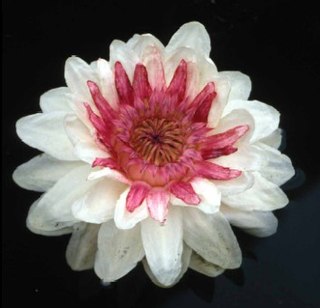
Brassavola is a genus of 21 orchids. They were named in 1813 by the Scottish botanist Robert Brown. The name comes from the Italian nobleman and physician Antonio Musa Brassavola. This genus is abbreviated B. in trade journals.
Queen Marcia was the legendary third female ruler and a regent of the Britons, as recounted by Geoffrey of Monmouth. She is presented by Geoffrey as "one of the most illustrious and praiseworthy of women in early British history".

Rhyncholaelia, abbreviated Rl. in the horticultural trade, is a genus of orchids, comprising two species. They are distributed in Mexico, Guatemala, Belize, and Honduras. Both species were originally published in Brassavola by Lindley. In 1918, Schlechter erected the new genus Rhyncholaelia and moved Brassavola digbyanaLindl. 1846 and Brassavola glaucaLindl. 1839 into it.

Potinara, abbreviated Pot in the horticultural trade, is the nothogenus comprising those intergeneric hybrids of orchids which have Brassavola, Cattleya, Laelia and Sophronitis as parent genera.

Laeliinae is a Neotropical subtribe including 40 orchid genera, such as Brassavola, Laelia and Cattleya. The genus Epidendrum is the largest within this subtribe, containing about 1500 species. This is followed by the genus Encyclia, with over 120 species.

Antonio Musa Brassavola was an Italian physician and one of the most famous of his time. He studied under Niccolò Leoniceno and Giovanni Manardo. He was the friend and physician of Ercole II, the duke of Este. He was also the consulting physician of Kings Francis I, Charles V, Henry VIII and Popes Paul III, Leo X, Clement VIII and Julius III. He performed the first successful tracheotomy, and published an account of it in 1546. He was the chair of philosophy in Ferrara and also studied botany and medicine. A genus of orchid, called Brassavola, is named after him.

The Flora of Colombia is characterized by 130,000 species of plants that have been described within Colombian territory.
This page lists orchid species according to their respective distribution range.

Brassavola cucullata, common name daddy long-legs orchid, is a species of orchid native to Mexico, Central America, the West Indies and northern South America.

Brassavola flagellaris is a species of epiphytic orchid of the Cattleya alliance. It grows wild in eastern Brazil, where it fills the evening air with the citrus-like fragrance of its blossoms.

Brassavola nodosa is a small, tough species of orchid native to Mexico, Central America, the West Indies, and northern South America. It is also known as "lady of the night" orchid due to its citrus and gardenia-like fragrance which begins in the early evening. It has been widely hybridized and cultivated for its showy flowers and pleasing scent.

Brassavola subulifolia is a species of orchid endemic to Jamaica.

Brassavola tuberculata is a species of orchid native to Bolivia, Paraguay and Brazil.

Brassavola venosa is a species of orchid found from Campeche, Oaxaca, Quintana Roo, El Salvador, Guatemala, Honduras and Nicaragua.

Stanhopea martiana is a species of orchid endemic to southwestern Mexico.

Astilbin is a flavanonol, a type of flavonoid. Astilbin is the (2R-trans)-isomer; neoisoastilbin is the (2S-cis)-isomer and isoastilbin is the (2R-cis)-isomer.

Stifftia is a genus of South American trees in the daisy family, Asteraceae.
Hymenaea martiana is a tree species in the genus Hymenaea found in Brazil and Paraguay.

Engeletin is a flavanonol glucoside, a phenolic compound found in wine and isolated from the bark of Hymenaea martiana.
















